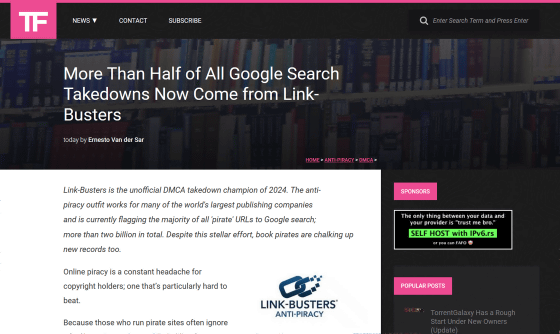It turns out that more than 50% of Google search result removal requests come from just one company

Major search engine Google is tackling online copyright infringement and is removing illegal content from Google search results in response to removal requests from rights holders under
More Than Half of All Google Search Takedowns Now Come from Link-Busters * TorrentFreak
https://torrentfreak.com/more-than-half-of-all-google-search-takedowns-now-come-from-link-busters-241230/

For a long time, the internet has been flooded with pirated content, including videos and books, but in recent years, companies and organizations that handle content have been actively working to combat online piracy. However, even if you directly request the operators of pirate websites to remove the content, your requests are often ignored.
Many rights holders are therefore making removal requests to search engines and other online platforms to prevent users from reaching pirate websites. Google has also seen a sharp increase in removal requests, with the total number of removal requests reported to have exceeded 10 billion in November 2024.
The total number of deletion requests for Google searches has finally exceeded 10 billion - GIGAZINE

Rather than submitting takedown requests themselves, rights holders typically outsource the task to specialized third-party companies that scan the web for pirated versions of the requested content and, if they find them, contact search engines and platforms like Google and request that they remove them.
Among them, Link-Busters, based in the Netherlands, has partnered with several global publishers and will send 2 billion requests to Google to remove pirated content by the end of 2024. Link-Busters just achieved its 1 billionth removal request in July 2024, meaning that it has sent 1 billion removal requests in just half a year.
In fact, more than half of the removal requests received by Google since the summer of 2024 have been sent by Link-Busters. This indicates that a significant number of removal requests sent to Google come from publishers who are on the lookout for copyright infringement. Link-Busters' clients include Penguin Random House , the world's largest publisher headquartered in the United States, Harper Collins , another American publisher, Taylor & Francis , a British academic publisher, and Massachusetts Institute of Technology Press .

The table below shows on the left 'domains to which Link-Busters sent particularly many removal requests' and on the right 'rights holders of content that sent particularly many removal requests'. Looking at the table on the left, it can be seen that

The reasons for the high number of Link-Busters removal requests include the same content being distributed across many different URLs and the fact that there are more book titles available than video content.
Many publishers are satisfied with Link-Busters' service. Penguin Random House said that Link-Busters was 'better at finding copyright infringement than its competitors, more responsive, and less plagued by false positives,' while Taylor & Francis claimed that Link-Busters 'helped us remove at least five times as many links as we did the previous year.'
But while Link-Busters is helping to stem the proliferation of pirated content, pirate websites are still growing. 'After all, Link-Busters will still have a lot of links to bust in 2025,' TorrentFreak wrote. 'At the current rate, they'll be sending billions of DMCA takedown requests to Google by 2025.'
Related Posts:
in Web Service, Posted by log1h_ik






